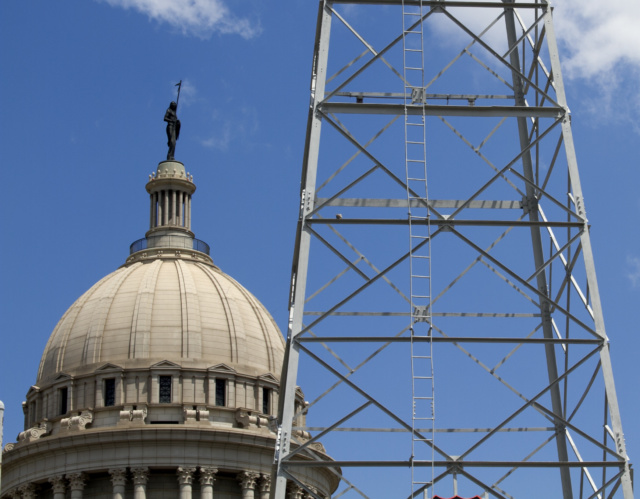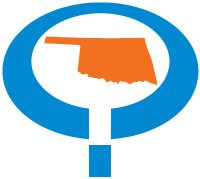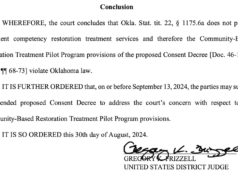
(Editor’s note: This story was authored by Trevor Brown and Mollie Bryant of Oklahoma Watch and appears here in accordance with the non-profit journalism organization’s republishing terms.)
In recent weeks, Oklahoma’s budget stood in limbo for a time as Republicans and Democrats battled over how much to raise gross production taxes on oil and gas wells.
But a third party was at the bargaining table: the oil and gas industry.
Oil and gas companies, along with their trade groups, have spent hundreds of thousands of dollars in campaign donations to lawmakers over more than two years, with top Republican leaders at the forefront of budget talks taking in some of the largest amounts. Republicans received more than 90 percent of total donations.
In all, sitting lawmakers took in about $683,000 – or about 6 percent of their total campaign donations from January 2015 to March 2017 – from oil and gas companies and trade organizations, their employees and their political action committees, an Oklahoma Watch review of campaign finance and other records found.
The industry’s preference for GOP candidates is not surprising given the party’s support of oil-and-gas priorities. But it was thrown into sharp relief during May when Democrats and Republicans fought bitterly over a bid to raise the oil and gas production tax.
The industry mobilized its employees to oppose the tax increase, spent more than $160,000 on TV ads and dispatched dozens of lobbyists to make its case to lawmakers.
Republican leaders agreed – a harmony in step with the industry’s campaign donations.
House Speaker Charles McCall (R-Atoka) hasn’t faced a primary or general election challenger since 2012 but raised more oil and gas money than any other sitting legislator during the 28-month period, according to Oklahoma Ethics Commission filings. The industry gave him $34,000, or 16 percent of his total donations.
His counterpart in the Senate, President Pro Tempore Mike Schulz (R-Altus) wasn’t up for re-election in 2016 and is term-limited from running again. Yet he took in the ninth highest amount from oil and gas ($15,000) and had one of the largest shares of oil and gas money (23 percent).
The donations don’t mean that legislators’ votes are being bought by the energy industry, which is a pillar of Oklahoma’s economy. Business and special-interest groups give to candidates who they believe will favor their viewpoints or bottom lines.
Corporate interests also spread their money around a bit, regardless of party.
Senate Minority Floor Leader John Sparks (D-Norman) received one of the largest shares of oil and gas donations, with about one-fifth of his total of $23,500 coming from the sector.
Aaron Cooper, a spokesman for Schulz, said it isn’t surprising that the Senate GOP leader received wide support from those who share his beliefs in “economic development, job creation and conservative, common-sense policies that promote accountability and fiscal responsibility in state government.”
But in a budget crisis with millions at stake, oil-and-gas advocates went all out to let those they support know what their position is.
Critics argued that core state services are imperiled.
“When you combine just the Oklahoma Oil and Gas Association and the (Oklahoma Independent Petroleum Association), they are the most powerful lobbying force in the state,” said Mike Cantrell, former OIPA board member who now co-leads a group of smaller oil firms pushing to restore gross production taxes to the historic 7 percent rate. “I can’t think of anyone else that comes close.”
Top 10 Senate recipients, January 2015 to March 2017
| Name | Total Donations | Energy Donations | Percent Energy | Number Energy |
| Bryce Marlatt (R-Woodward) | $125,696 | $25,701 | 20.4% | 20 |
| Greg Treat (R-Oklahoma City) | $256,856 | $23,197 | 9.0% | 24 |
| Adam Pugh (R-Edmond) | $203,995 | $19,801 | 9.7% | 21 |
| Dan Newberry (R-Tulsa) | $382,614 | $16,050 | 4.2% | 18 |
| Mike Schulz (R-Altus) | $64,350 | $15,000 | 23.3% | 9 |
| Julie Daniels (R-Bartlesville) | $120,647 | $13,700 | 11.4% | 39 |
| Greg McCortney (R-Ada) | $146,488 | $12,401 | 8.5% | 16 |
| David Rader (R-Tulsa) | $234,900 | $12,050 | 5.1% | 18 |
| James Leewright (R-Bristow) | $115,396 | $11,000 | 9.5% | 9 |
| Chris Kidd (R-Addington) | $112,710 | $9,201 | 8.2% | 10 |
Top 10 House recipients, January 2015 to March 2017
| Representative | Total Donations | Energy Donations | Percent Energy | Number Energy |
| Charles McCall (R-Atoka) | $211,951 | $33,751 | 15.9% | 21 |
| Weldon Watson (R-Tulsa) | $62,446 | $17,001 | 27.2% | 16 |
| Zack Taylor (R-Seminole) | $81,463 | $15,575 | 19.1% | 25 |
| Todd Thomsen (R-Ada) | $84,125 | $15,550 | 18.5% | 22 |
| Mike Sanders (R-Kingfisher) | $163,984 | $13,751 | 8.4% | 13 |
| Kevin Calvey (R-Oklahoma City) | $107,931 | $13,701 | 12.7% | 18 |
| Jon Echols (R-Oklahoma City) | $128,650 | $13,250 | 10.3% | 12 |
| Scott Biggs (R-Chickasha) | $101,912 | $12,751 | 12.5% | 17 |
| Scott Inman (D-Del City) | $213,687 | $11,500 | 5.4% | 14 |
| Katie Henke (R-Oklahoma City) | $117,105 | $11,350 | 9.7% | 12 |
In both parties, leaders received higher amounts than rank-and-file members. According to Ethics Commission filings since the start of 2015, the average member of the current 145-member Legislature has accepted more than $4,600 from industry-connected donors.
The average Republican took in about $5,400 from oil and gas donors, which represents about 6 percent of their total. The average Democrat took in just under $2,000, or about 3 percent of their contributions.
With McCall and Schulz leading revenue negotiations, Democrats have accused Republicans of catering to the industry’s wishes.
House Minority leader Scott Inman (D-Del City), for instance, said Gov. Mary Fallin, McCall and Schulz consulted by phone with Devon Energy co-founder Larry Nichols during a recent budget negotiation meeting with Democrats.
“I know the public supports at least going to a 5 percent gross production tax,” Inman said. “But the one entity standing in the way is the oil and gas industry.”
Democrats initially sought increasing the rate from 2 percent to 5 percent for new and existing wells, but after tedious negotiations said they would settle for a 5 percent rate on wells drilled after July 1.
GOP lawmakers responded by offering 4 percent for new wells.
But neither side was willing to budge.
In the end, Republicans decided to back a proposal that wouldn’t need Democrats’ votes: increasing the rate from 1 percent to 4 percent for horizontal wells drilled between 2011 and 2015. The 4-percent rate lasts for a well’s first four years before rising to 7 percent.
The change is expected to raise about $95 million next year. Democrats argued this wasn’t enough to address future budget shortfalls because it would generate less money in 2019 and no money afterward.
McCall and Schulz said they have an ideological objection to raising the gross production rate too sharply, and add they have not been swayed by the industry’s campaign dollars.
Meanwhile, McCall said the Democrats’ 5 percent proposal would lead to the “same type of massive layoffs” that oil and gas experienced 18 months ago when prices plummeted.
“We’re in a very fragile economic situation and we don’t want to discourage investment and job growth in the state of Oklahoma,” he said.
Industry insiders agree.
“When a rig is running, it produces other tax revenue streams, like sales tax, labor income tax, because we’re hiring,” said Donelle Harder, Oklahoma Oil and Gas Association vice president of communications. “So, the best opportunity for the state to get more money right now is through the act of drilling.”
Democrats say the argument doesn’t hold up.
Inman said companies would still make a significant profit with a higher tax rate. He pointed to recent comments from Warwick Energy CEO Kate Richard, who said the state’s two major oil plays are so rich in oil that they can generate returns of up to 60 percent at just $40 to $50 per barrel, where prices have been this month.
“And (oil and gas companies) can’t afford to give up 3 percent to help a public school child?” Inman asked. “I’m not buying it.”
What campaign donations mean
Whether campaign donations directly affect a lawmaker’s actions is a matter of debate. Harder said it is doubtful a lawmaker will ultimately vote a certain way just because they received money from the industry. She noted many legislators received industry donations but still voted to increase gross production taxes.
“If that money (since then) was influential, I strongly believe these legislators would understand that the industry’s been down and out, trying to figure out a new way to operate in the current commodity price environment,” she said. “Now that we’re creating jobs again, to change the tax rate right now doesn’t make good policy sense.”
Cantrell, the former petroleum association board member who is chairman of the oil and gas company Cantrell Investments LLC, said the industry’s influence expands beyond just donations to individual candidates.
“It’s funding the political action committees, so you’ve got to look at that, too,” he said.
In addition to the $683,000 oil and gas companies spent directly on lawmakers’ campaigns, they also donated tens of thousands to PACs that support Republican or Democratic lawmakers.
Donations included $50,500 to the Senate Majority Fund, $14,750 to the Republican State House Committee and $27,500 to the Oklahoma State Republican Senatorial Committee. Meanwhile, just $7,500 went to the Democrats of the Oklahoma State Senate.
Inman said the oil industry lobby hadn’t reached out to him because they already knew where he stood. Instead, they applied that pressure to McCall and Schulz to not alter the tax, he said.
Inman, who received $11,500 in energy-related donations from 2015 to 2017, said he doesn’t believe campaign contributions sway votes, but they do come into play during elections.
“I don’t know that members in either party really make voting decisions based on who contributed to them,” Inman said. “But I think there is fear, especially upon the Republican majority, that if they stand up, (companies) may spend tens of thousands of dollars to oppose them.”
Rep. Weldon Watson (R-Tulsa) chair of the House Energy and Natural Resources Committee, said it’s no surprise Republicans receive more than Democrats since the GOP has traditionally advocated for deregulation and pro-business policies.
But Watson, a former oil and gas executive who was in charge of his company’s PAC spending before he was elected to the Legislature in 2007, said companies look at various factors when deciding where and how much to spend.
In addition to things such as voting records and party affiliation, he said, spending money on incumbents is a priority because they are likely to win re-election.
But he said the donations don’t guarantee a candidate will vote the industry’s way. Watson said he is proof of this.
He accepted a greater share of oil and gas donations – 26 percent of his total – than any other legislator. But he said he would have supported increasing the gross production tax for new wells, not just the wells drilled between 2011 and 2015.
“I am a very big supporter of energy, and I do believe a low GPT is an incentive,” he said. “However, I’m in favor of raising a GPT.”
Lobbying efforts
Campaign contributions aren’t the only way the industry leverages its deep pockets to influence the Legislature.
Oil and gas companies and their associations hired at least 49 lobbyists this legislative session, Oklahoma Ethics Commission filings show.
The Oklahoma Independent Petroleum Association was active on social media, in some cases targeting individual lawmakers such as House Budget Chairwoman Rep. Leslie Osborn, R-Mustang, who had said she was open to a production tax increase. Some lawmakers called the campaign a bullying tactic.
The group also led a lobbying effort that brought dozens of energy employees to the Capitol on the second-to-last week of the session.
“The reality is they do have a lot of presence at the Capitol,” said Rep. Todd Thomsen (R-Ada). “And when you have a lot of presence, it means your message is being told a lot.”






















